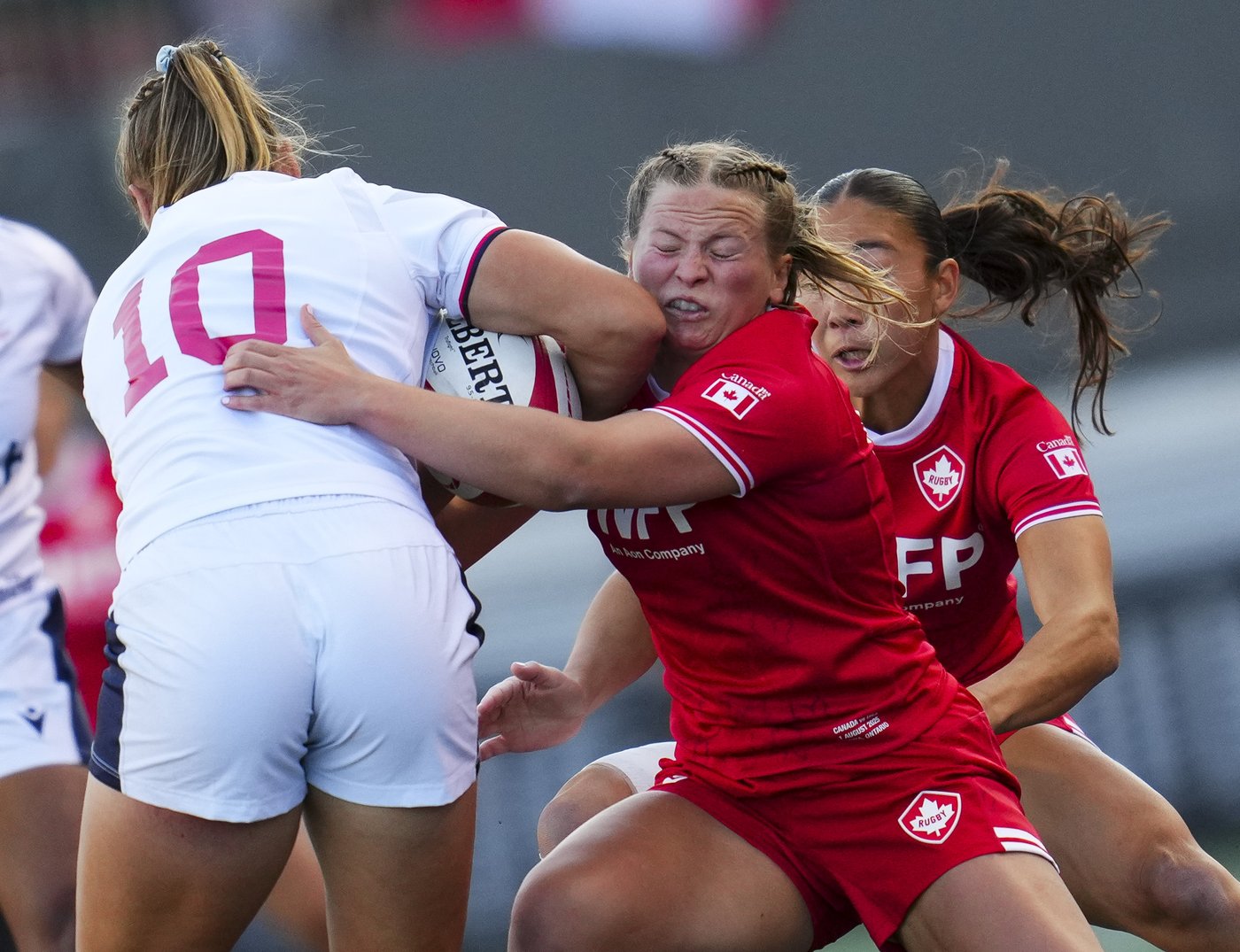Elevate your local knowledge
Sign up for the iNFOnews newsletter today!

On the eve of the tournament, Rugby Canada has announced it has reached 95 per cent of its $1 million target for its “Mission: Win World Cup 2025” fundraising campaign.
While the Canadian women are ranked second in the world and seen as legitimate contenders to challenge No. 1 England, which is hosting the expanded 16-country tournament, they are have-nots off the field compared to other top teams.
The Canadian women get paid the same as the men for wearing the Maple Leaf, according to a deal negotiated with the Canadian Rugby Players Association. It is not much.
“If they did everything this calendar year, they can earn about 12K,” said Rugby Canada CEO Nathan Bombrys, adding there are some “success bonuses” on top of that.
Rugby Canada has looked to pool its resources on and off the field, making the most of what it has with talent flowing between the sevens and 15s squads.
Veteran flanker Karen Paquin, the Canadian Olympic Committee representative on the Rugby Canada board of directors, believes the governing body is on the right course.
“There have been a lot of people that have worked really hard to change things and to ask questions and to make sure that we keep evolving,” said the 38-year-old Paquin, who is headed to her fourth World Cup.
“I think we’re heading into a good direction, a good place. And I think you can see it on the field.”
But Rugby Canada can only do as much as its bottom line allows. And that is modest.
Rugby Canada reported revenue of $20.21 million in 2024, with some $11.5 million coming from World Rugby, Sport Canada, Canadian Olympic Committee, Canadian Olympic Foundation and other grants
Contrast that with England’s Rugby Football Union, which cited revenue of 175.2 million pounds ($327.2 million) for the year ending June 30, 2024. And that was down from 221.4 million pounds ($413.5 million) the year before, with the drop attributed to fewer home Six Nations games and no men’s Autumn Nations Series matches.
England has 32 women under full-time contracts for the 2024-25 season, with another eight on “transition contracts.” And that is in addition to their club contracts.
New Zealand, Australia and other Six Nations countries like Scotland, Ireland and Wales also offer player contracts.
“I don’t see this as a women’s rugby problem. This is kind of where rugby is in Canada,” said Bombrys. “And we’re up against nations that have established major revenue streams like the Six Nations tournament. And the RFU or Scottish Rugby, or IRFU (Irish Rugby Football Union) could spend more on their teams if they choose to. They have the ability to do that. We just don’t.”
Bombrys notes that Scotland’s Glasgow Warriors, the United Rugby Championship side he ran as managing director from 2011 to 2021, had the same budget as Rugby Canada.
“England will have, we reckon, about 10 times the resources that we do,” he said. “But they don’t have our players. And that’s something special … Frankly, any of these young people that put on the Canadian jersey, men or women, they’re not doing it for the money. They know they’re up against it in terms of resources and time. I think the biggest thing that resources buy is time together, time for the Canadian team to be together — to prepare, train and improve.”
Bombrys said the fundraising campaign came out of the need to fill a $1 million shortfall in paying for Canada coach Kevin Rouet’s tournament preparation plan.
“As an organization, we actually provided more money than probably we’ve ever been able to put behind a Canadian team but it’s still 10 per cent of what England have and, I don’t know, 15 or 20 per cent of some of what the other top countries have.”
World Rugby looks after the travel and accommodation costs of teams at the World Cup.
Of the 32 players on the Canadian World Cup squad, 20 are affiliated with teams in England or France. Most earn room and board but little else, says veteran prop DaLeaka Menin, who plays for the Exeter Chiefs.
“Generally, you break even,” said Menin. “You’re not losing money being over there but you’re maybe not gaining any money to put into savings or maybe apply to the future.”
Bombrys credits the Canadian players for making do with what Rugby Canada has been able to offer.
“They’ve made this commitment to each other, to Canada, and they appreciate the support,” he said. “I certainly am very proud to be part of this and to be part of this group of players and what they’re trying to achieve.”
England’s Red Roses reportedly will each earn a bonus of 15,000 pounds ($28,015) if they win the tournament.
New Zealand’s Black Ferns collected a bonus of 25,000 New Zealand dollars ($20,190) for winning in 2022, with then-prime minister Jacinda Ardern joining others in saying the women deserved equal pay, given the All Blacks received bonuses of 150,000 New Zealand dollars ($121,135) after their World Cup win in 2015.
The World Cup kicks off Friday with England facing the 10th-ranked U.S in Sunderland. Canada opens Saturday against No. 14 Fiji in York.
—
This report by The Canadian Press was first published Aug. 20, 2025
Want to share your thoughts, add context, or connect with others in your community?
You must be logged in to post a comment.